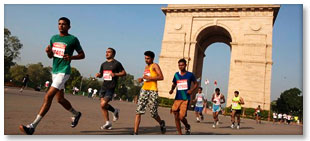 Nutrition Training Nutrition Training
- Fluid needs: During a marathon, average sweat rates are anywhere between 0.5-1.5 litres of fluid every hour, and can be higher depending on individual sweat rates or if racing in hot or humid conditions. Maintaining hydration is critical for marathon running. Sports drinks can be a convenient way to replace both fluid and carbohydrate losses during the race
- Choose the right sports drink: A sports drink must have carbohydrates and sodium. The optimum composition for sports drinks is 4-8% carbohydrate and 500-700 mg/litre of sodium
- Diet for training: Eat a variety of food from each of the four major food groups each day (breads and cereals; vegetables and fruits; milk, dairy products and milk substitutes, especially low-fat varieties; lean meats, poultry, fish, eggs, nuts and meat substitutes like lentils, chickpeas, soy beans and other beans)
- Nutritional plan: During the week before your race you should start a super compensation eating plan. Super compensation involves depleting your muscles of carbohydrate followed by a loading period.
The best types of carbs to eat during your marathon taper are also low GI carbs so that your blood glucose levels maintain a steady state
Final Taper Week
- Day 1 – Exercise Duration – 60 minutes, Carb intake – 60%
- Day 2 – Exercise Duration – 40 minutes, Carb intake – 50%
- Day 3 – Exercise Duration - 30 minutes, Carb intake – 40%
- Day 4 – Exercise Duration – 20 minutes, Carb intake – 70%
- Day 5 – Exercise Duration – Rest, Carb intake – 70%
- Day 6 – Exercise Duration – Rest, Carb intake – 70%
- Day 7 – Race Day
|

 Nutrition Training
Nutrition Training



